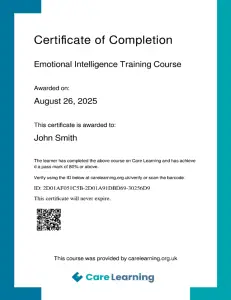This free positive psychology online course introduces the foundations of positive psychology, covering happiness, meaning, strengths, resilience, and mindfulness. It combines research-based theories with practical strategies you can use in both personal and professional settings.
Why Take This eLearning Course?
Positive psychology has transformed the way we understand human wellbeing. From Martin Seligman’s PERMA model to the role of resilience and self-compassion, its principles provide practical insights that can be applied to everyday life and care practice.
Here’s why this course is for you:
- Build resilience and optimism: Learn how positive thinking styles and evidence-based interventions improve coping skills.
- Enhance wellbeing and happiness: Understand what it means to flourish and explore techniques to improve quality of life.
- Develop personal strengths: Identify and apply your values and strengths in daily life and professional practice.
- Support others effectively: Apply positive psychology principles to build stronger relationships and foster hope in people you care for.
- Practical focus: Use tools like mindfulness, self-compassion exercises, and goal-setting frameworks to improve both your own and others’ wellbeing.
Module 1: Foundations of Positive Psychology
Learners will explore the core principles of positive psychology, its history and development, and the work of key contributors such as Martin Seligman. This module includes a video introduction to the discipline, setting the foundation for the rest of the course.
Module 2: Happiness and Well-being
This module examines the concept of flourishing and its significance for health and happiness. Learners will review the PERMA model—Positive Emotions, Engagement, Relationships, Meaning, and Accomplishment—and explore interventions that enhance subjective well-being.
Module 3: Values and Strengths
Learners will consider the role of personal values in well-being and identify their strengths using tools like the VIA Strengths Survey. They will explore practical examples of applying strengths in daily life, supported by an NHS-based video resource, before completing a knowledge check.
Module 4: Meaning and Purpose
This module introduces the psychology of meaning and purpose. Learners will examine theories from Viktor Frankl and Martin Seligman, and review strategies to cultivate a stronger sense of purpose in personal and professional life.
Module 5: Positive Relationships
Learners will explore how positive relationships contribute to well-being. Theories such as Sternberg’s and Gottman’s will be reviewed, alongside practical techniques to strengthen relationships. A TEDx London video resource highlights habits that foster successful connections.
Module 6: Flow and Engagement
This module examines the concept of flow, its defining characteristics, and the activities that promote it. Learners will understand the benefits of being fully engaged in tasks and test their knowledge with an interactive check.
Module 7: Resilience and Optimism
Learners will define resilience and its importance in overcoming adversity. They will explore Cognitive Behavioural Therapy (CBT) techniques that support resilience, and compare optimism and pessimism as explanatory styles for life events.
Module 8: Mindfulness and Self-Compassion
This module explores mindfulness and its evidence-based benefits, alongside principles of Acceptance and Commitment Therapy (ACT). Learners will practise mindfulness and self-compassion techniques to support their own well-being.
Module 9: Goals and Accomplishments
Learners will apply SMART goal-setting principles and explore the role of a growth mindset in achievement. They will also review strategies for accomplishing meaningful goals in a sustainable way.
Module 10: Conclude and Reflect
This module brings together key concepts of positive psychology and encourages learners to reflect on their personal growth throughout the course. Learners will consider next steps for applying positive psychology in everyday life.
Learning Outcomes
By the end of this course, learners will be able to:
- Define positive psychology and describe its history, development, and key contributors.
- Explain the PERMA model and how it supports wellbeing and flourishing.
- Identify personal values and strengths and apply them to enhance wellbeing.
- Understand the role of meaning, purpose, and positive relationships in resilience and happiness.
- Apply practices such as mindfulness, self-compassion, and flow to promote engagement and fulfilment.
- Set and achieve goals using growth mindset principles and SMART frameworks.
- Reflect on personal growth and apply positive psychology in health, social care, and everyday life.
Target Audience
This course is designed for:
- Health and social care professionals.
- Carers and support workers.
- Team leaders and managers interested in wellbeing strategies.
- Anyone seeking to build resilience, optimism, and happiness in their personal or professional life.
No prior knowledge of psychology is needed — the course introduces key concepts in a clear and accessible way.
FAQ
What does the course cover?
It covers the foundations of positive psychology, including flourishing, resilience, mindfulness, meaning, strengths, and goal-setting. You’ll explore both theory and practical techniques.
Can I use what I learn immediately?
Yes. The course is designed to be highly practical, offering tools and strategies you can apply right away in your role and daily life.
How long does it take?
The course is self-paced, typically taking 1 hour to complete depending on your schedule.
Do I receive a certificate?
Yes. On completion, you’ll receive a certificate to recognise your learning.
Is this course relevant to UK health and social care?
Yes. It is tailored to UK practice, supporting professionals in promoting wellbeing in line with person-centred care principles.
Is it CPD accredited?
Accreditation is currently in progress, and certificates will be updated once CPD endorsement is confirmed.
You must log in and have started this course to submit a review.
Positive Psychology Training Course CPD Accredited and Government Funding
We’re working on getting this Positive Psychology Training Course CPD accredited, and any course that’s approved will be clearly labelled as CPD accredited on the site. Not every health and social care course has to be accredited to help you meet CQC expectations – what matters is that staff are competent, confident and properly trained for their roles under Regulation 18. Our courses are built to support those requirements, and because they’re not government funded there are no eligibility checks or ID needed – you can enrol and start learning straight away.



